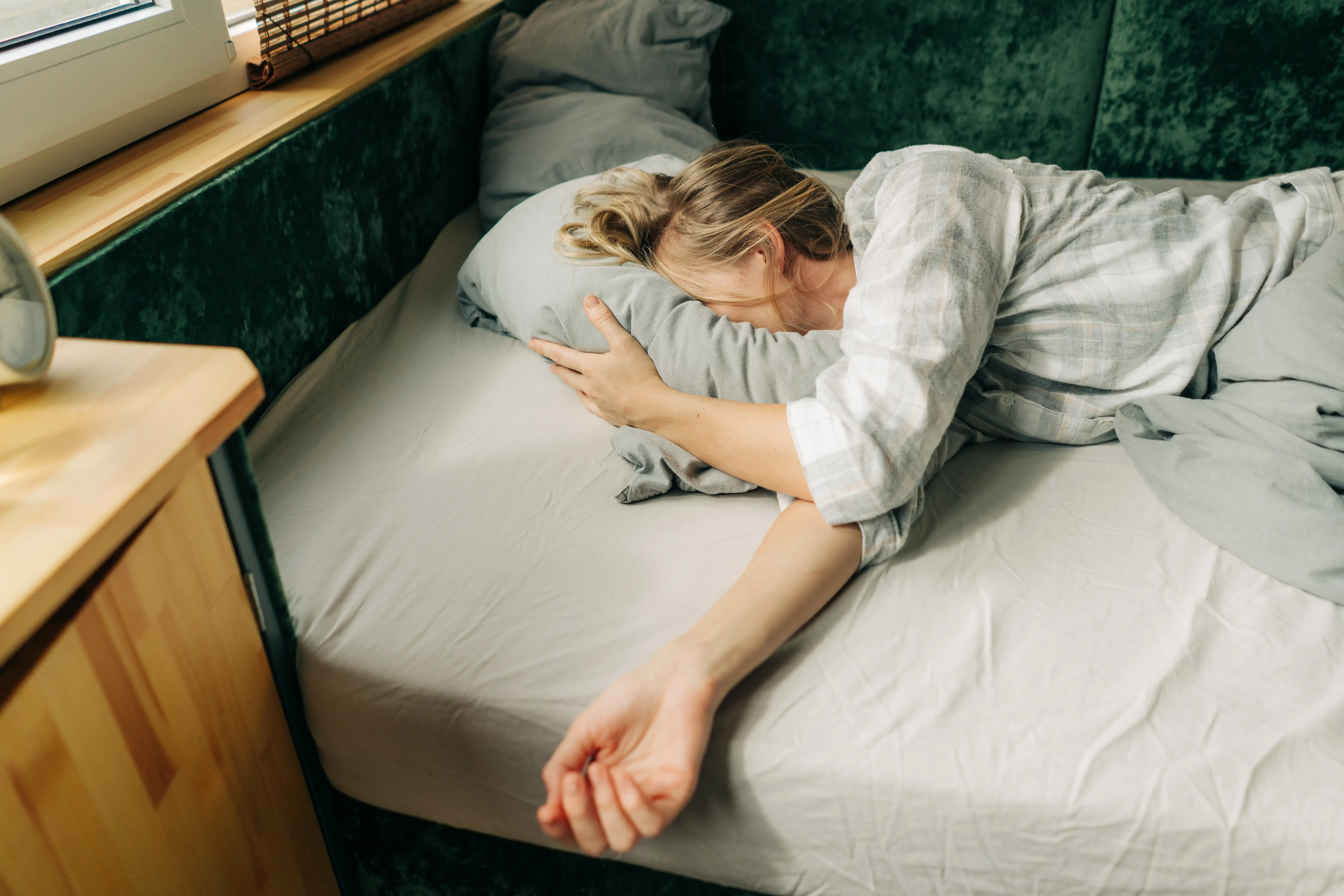Whether it's the initial shock of loss or the long, quiet ache that follows, grief can profoundly disrupt our mental health and our ability to rest. Many people find themselves lying awake at night, struggling with racing thoughts, vivid dreams, or a deep sense of emptiness.
This article examines the relationship between grief and sleep, highlighting why understanding this connection is crucial for emotional and physical healing.
The Science Behind Grief and Sleep Patterns
Grief triggers a complex neurobiological response that disrupts sleep through changes in brain chemistry and hormonal balance.
The stress of loss elevates cortisol levels, which can interfere with the body’s natural circadian rhythms. This persistent brain activity can lead to vivid dreams, insomnia, or fragmented sleep, deepening emotional and physical fatigue.
Neurotransmitter Disruption
Grief alters levels of neurotransmitters like serotonin, dopamine, and norepinephrine, which regulate mood and sleep. A drop in serotonin, for instance, can interfere with both falling and staying asleep.
These chemical imbalances also affect the production of melatonin, the hormone that governs the sleep-wake cycle. As a result, grief can create a neurological environment that is hostile to healthy, consistent sleep.
Limbic System Overactivity
The limbic system—responsible for emotion processing—becomes hyperactive during periods of intense grief. This overactivity leads to heightened emotional responses that often spill into the night.
Individuals may experience vivid dreams, emotional surges, or even crying in their sleep. Constant stimulation of the amygdala and hippocampus can prevent the brain from fully entering restful sleep stages.
How Grief Affects Sleep
Losing someone or something meaningful can turn life upside down—emotionally, mentally, and even physically. Whether it’s struggling to fall asleep, waking up in the middle of the night, or sleeping too much, grief can disrupt natural sleep rhythms in many ways.
Below are some of the most common patterns people experience as they navigate loss:
Frequent Night Wakings
Even if they fall asleep, many wake up multiple times during the night, interrupting the body's natural sleep cycles. These awakenings can be triggered by nightmares, sudden emotional waves, or even crying in sleep.
Sleep becomes fragmented and shallow, depriving the body of needed rest. People may start to dread the night, anticipating emotional discomfort instead of relief.
Difficulty Falling Asleep
Depression, sadness, or racing thoughts can keep the mind too active to settle into rest. People may find themselves replaying conversations or imagining different outcomes, prolonging the time it takes to drift off.
Lying in bed can become an emotionally loaded experience rather than a relaxing one. This difficulty can extend for weeks, turning sleep into a nightly struggle.
Early Morning Awakening
Some wake up hours before they need to, unable to return to sleep due to emotional distress. The early morning quiet can amplify feelings of emptiness or dread, making it difficult to fall back asleep.
These awakenings are often marked by sadness, crying, or anxiety. Over time, the lack of deep sleep can lead to chronic fatigue and emotional burnout.
Fatigue Despite Sleep
Even when sleep happens, it's often not restful. The emotional and physiological toll of grief may prevent the body from reaching deep, restorative stages of sleep.
This leads to waking up feeling just as worn out as before going to bed. People may also experience a lack of motivation or energy throughout the day, further deepening the grief-sleep cycle.
Restless Sleep
Tossing and turning throughout the night is common, as grief often leads to an unsettled body and mind. This restlessness results in fragmented sleep and reduced overall sleep quality.
The body may physically reflect emotional tension, resulting in muscle stiffness or discomfort. Such movement disrupts sleep architecture and prevents restful sleep.
Emotional Overwhelm at Bedtime
Bedtime can trigger heightened emotions as the distractions of the day fade, making it harder to relax. The stillness of night may bring up feelings of loneliness, sadness, or fear that were kept at bay during the day.
This emotional flood can prevent both physical and mental readiness for sleep. For some, bedtime becomes the most emotionally difficult part of the day.
Sleep Avoidance Due to Sadness
Some avoid going to bed entirely, as silence and solitude can amplify feelings of loneliness or grief. This avoidance can lead to an unhealthy cycle of sleep deprivation and emotional fatigue.
Instead of sleeping, they may engage in distracting behaviors like excessive screen time. Over time, this habit further delays healing and deepens the emotional strain. This may even cause a fear of sleep.
Common Sleep Issues Associated with Grief

As the mind and body process loss, sleep often becomes irregular, shallow, or emotionally charged. These disruptions are not just symptoms—they're reflections of the deep emotional shifts happening within. Here are some of the most common sleep challenges people face during periods of grief:
Insomnia
Difficulty sleeping is one of the most widely reported symptoms of grief, often persisting for weeks or even months.
This can make daily functioning harder and slow down the healing process. Insomnia may also worsen depression and increase vulnerability to physical illness. Without treatment, it can become a long-term issue even after the grief softens.
Hypersomnia
In contrast to insomnia, individuals with hypersomnia sleep excessively as a coping mechanism or escape from emotional pain.
This oversleeping can be a form of withdrawal or emotional numbness. It may feel like a temporary relief from suffering, but it often masks deeper emotional needs. Over time, it can interfere with daily responsibilities and personal recovery.
Nightmares and Night Terrors
Traumatic loss can lead to vivid or terrifying dreams, disrupting sleep and contributing to nighttime anxiety. These episodes may feel emotionally real and lead to a fear of going to sleep.
Although night terrors are more common in children, they can also occur in adults who are experiencing extreme emotional strain. Recurrent nightmares can re-trigger the pain of loss and deepen emotional wounds.
Sleep Paralysis
Some grieving individuals may experience sleep paralysis—a temporary inability to move or speak while falling asleep or waking up. It can be terrifying, especially when accompanied by hallucinations or emotional stress tied to the loss.
Sleep paralysis is often associated with disrupted REM cycles, which grief can heavily affect. The combination of emotional and physical immobility can leave a lasting psychological impression.
Disrupted Circadian Rhythm
Grief can throw off the body’s internal clock, leading to irregular sleep and wake times. This misalignment may cause people to feel worn out at unusual hours or alert when they should be resting. Social isolation or withdrawal may worsen these shifts as routines break down.
A disrupted circadian rhythm can lead to long-term sleep issues and difficulty reintegrating into daily life.
Sleep Patterns in Different Grieving Stages

Grief impacts sleep in unique ways throughout its emotional stages. From restlessness in anger to oversleeping during depression, each phase disrupts rest differently.
Understanding these patterns helps normalize the experience and supports healing. Recognizing the link between grief and sleep is a key step toward self-awareness and emotional recovery.
Denial – Disrupted Sleep Schedule
During denial, individuals may unconsciously avoid sleep because it feels too final or empty without the person they lost.
This leads to irregular sleep routines or staying up unnaturally late to delay silence and solitude. People in denial often don’t register how disrupted their sleep has become. They may justify poor rest as temporary or unrelated to the grieving process.
Anger – Restlessness and Trouble Falling Asleep
In the anger stage, intense frustration or resentment can make it difficult to relax the body and mind for sleep.
Racing thoughts about injustice, abandonment, or regret may keep individuals tossing and turning. Physical tension often accompanies this stage, adding to restlessness. Even if sleep comes, it’s often shallow and easily broken by intrusive thoughts.
Bargaining – Late-Night Overthinking
This stage is marked by "what ifs" and endless mental negotiations, which tend to surface at bedtime. Individuals often lie awake rethinking scenarios, imagining different outcomes, or feeling consumed by guilt.
This cognitive overdrive prevents the brain from transitioning into sleep mode. Nighttime becomes a mental battleground of regret and imagined possibilities.
Depression – Oversleeping or Insomnia
Grief-related depression can cause either hypersomnia (sleeping too much) or insomnia (inability to sleep).
Oversleeping may serve as an escape, while insomnia is fueled by hopelessness and anxiety. In either case, restorative rest becomes elusive. Sleep quality suffers due to the emotional weight pressing on both the conscious and subconscious mind.
Acceptance – Gradual Sleep Stabilization
In acceptance, emotional intensity lessens, allowing the nervous system to calm and regulate sleep more naturally.
Bedtime becomes less emotionally charged, and routines slowly re-establish themselves. Though occasional disruptions may remain, the body and brain begin to trust sleep again. With healing comes a more predictable and restful sleep rhythm.
Shock – Fragmented Sleep
The initial shock of loss often leads to unpredictable, broken sleep patterns. People may wake up frequently or not feel tired at all, driven by adrenaline and emotional numbness.
Night wakings can be accompanied by disorientation or panic. This stage can last for days or weeks, especially following a sudden or traumatic loss.
Yearning – Dreaming of the Deceased
In the yearning stage, the brain may process grief through vivid dreams of the lost loved one. These dreams can feel comforting or deeply unsettling, sometimes creating emotional turmoil upon waking.
The subconscious uses dreaming as a way to “spend time” with the deceased. However, this process may also prolong grief or disrupt sleep if the dreams become too intense.
Guilt – Sleep Avoidance or Night Wakings
Guilt can keep the mind too active or self-punishing to rest, leading to sleep avoidance. Some may subconsciously resist sleep as a form of self-denial or as “punishment” for perceived failures.
Night wakings can be triggered by guilt-fueled dreams or sudden emotional jolts. Over time, guilt-driven sleep disruption can spiral into chronic insomnia.
Anxiety – Racing Thoughts at Bedtime
This stage often comes with heightened anxiety, making it difficult to quiet the mind at night. Worry about the future, lingering fears, or general restlessness can lead to long sleep latency.
People may experience physical symptoms like a racing heart or shallow breathing. Even when sleep occurs, it’s often restless and non-reparative.
Adjustment – Return to Normal Sleep Rhythm
As healing progresses, sleep begins to follow a more natural and consistent pattern. The emotional charge around bedtime decreases, and routines become easier to maintain.
Dreams may still occur, but tend to be less emotionally jarring. With adjustment, the body regains its trust in sleep as a place of safety and recovery.
Strategies for Managing Grief to Improve Sleep Quality

Establish a Grounding Sleep Routine
Creating a consistent bedtime routine helps signal to the brain that it's time to rest. Repeating calming rituals like reading, stretching, or tea drinking can encourage a sense of balance amid emotional chaos.
In grief, predictability can offer comfort when everything else feels uncertain. Over time, a structured routine can retrain the body to anticipate sleep.
Incorporate Physical Activity
Engaging in regular physical activity helps reduce stress hormones and regulate mood. Light to moderate exercise, like walking or yoga, can be particularly helpful during the day.
Physical fatigue can improve sleep onset and quality at night. Just avoid intense workouts too close to bedtime, as they may increase alertness temporarily.
Use Relaxation Techniques
- Progressive Muscle Relaxation: This technique involves tensing and slowly releasing each muscle group in the body, promoting physical calm. It helps people notice and release tension they might not realize they’re holding.
- Deep Breathing: Slow, controlled breathing helps activate the parasympathetic nervous system, lowering heart rate and calming the mind. Breathing exercises can reduce anxiety and create a sense of safety in the body.
- Sleep Meditations: Guided meditations specifically designed for sleep help quiet the mind and soothe emotional distress. Many grieving individuals find comfort in the structure and reassurance these meditations offer.
Staying Present
Practicing mindfulness helps bring attention away from distressing memories and toward the present moment. It prevents the mind from spiraling into regret or fear, both common in grief.
Staying present allows for emotional grounding, especially when lying awake. Daily mindfulness exercises can reduce overall anxiety and improve sleep readiness.
Bedtime Meditation
Meditating at bedtime helps release lingering tension and slow the mind for sleep. Focusing on breath, a calming mantra, or simple visuals can lower mental noise.
Regular practice builds emotional resilience and reduces sleep-related anxiety. It's a gentle way to shift from grief-fueled rumination into restorative rest.
Building Mental Resilience
Resilience doesn’t mean ignoring pain—it means building tools to face it without collapse. Journaling, therapy, or support groups can strengthen coping mechanisms.
Strengthening mental health during the day often reflects in improved sleep at night. Over time, resilience helps reduce the emotional weight carried into bedtime.
Bedroom Setup
Creating a restful environment is essential, especially when sleep is fragile. Keep the space clean, cozy, and free of grief triggers (like photos, if they cause pain).
Use calming scents, soft textures, and low lighting to promote relaxation. A safe and inviting sleep space can act as a healing refuge.
Light and Temperature
Dimming lights in the evening helps cue the body’s natural melatonin production. Avoiding screens an hour before bed can prevent blue light from delaying sleep onset.
Keeping the room slightly cool improves sleep depth and continuity. Adjusting lighting and temperature supports the body’s readiness for rest.
Minimize Noise and Distraction
External disturbances can feel especially jarring when you're emotionally raw. Use white noise machines, earplugs, or calming sounds to block out distractions.
Decluttering the room can also reduce mental and visual overwhelm. A calm and quiet environment allows the nervous system to relax into sleep more easily.
FAQs
How long do sleep disturbances last after experiencing grief?
Sleep disturbances can vary widely in duration depending on the individual and their circumstances. While some people may experience sleep issues for a few weeks, others might struggle for several months. It's important to monitor your symptoms and seek help if they persist or worsen.
Can medication help with sleep problems related to grief?
In some cases, medication might be prescribed to address severe sleep disturbances. However, it's essential to consult a healthcare professional to determine the most appropriate treatment for your situation. Medication should be used in conjunction with other coping strategies.
Is it normal to experience vivid dreams or nightmares during grief?
Yes, vivid dreams and nightmares are common during grief as your mind processes emotions and memories. While distressing, these dreams often diminish over time. Practicing relaxation techniques before bed can help reduce their frequency.
What lifestyle changes can support better sleep during grief?
Establishing a consistent sleep schedule, engaging in regular physical activity, and creating a calming bedtime routine can all support better sleep during grief. Additionally, reducing caffeine and alcohol intake can minimize sleep disruptions.
How can I support someone else who is grieving and experiencing sleep issues?
Offer your understanding and patience, and encourage them to talk about their feelings. Suggest activities that promote relaxation and provide a comforting presence. Encourage them to seek professional help if sleep issues persist.
What role does diet play in managing sleep during grief?
A balanced diet can support overall health and well-being, which can indirectly improve sleep quality. Eating nutritious meals and staying hydrated can help regulate energy levels and mood, contributing to better sleep.
Conclusion
Sleep may feel elusive during times of grief, but recognizing its importance is a vital step toward recovery. By understanding how loss affects our sleep and learning strategies to support rest, we can begin to restore the balance our minds and bodies need.
Jessica H.
Jessica is a reviewer, writer, and sleep enthusiast at Sleepiverse. Jessica graduated with her master's degree in Nursing research and education. She is a registered nurse and currently works in the Intensive Care Unit. Since becoming a nurse, Jessica has worked the night shift, which means a disrupted sleep schedule. Knowing she needed to function at her best while caring for patients at night, she spent a lot of time researching how to sleep well with a difficult schedule.


